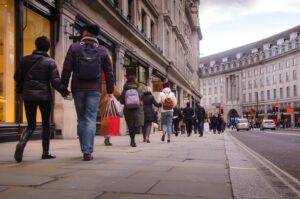
UK retail sales rise unexpectedly in September despite economic uncertainties

UK retail sales rose unexpectedly in September, defying analyst predictions of a contraction, as consumers increased spending on technology despite impending tax rises and economic uncertainties.
According to the Office for National Statistics (ONS), retail transactions grew by 0.3% in September, building on a strong 1% increase in August. Analysts had forecast a 0.4% decline for the month.
While technology equipment saw strong sales, supermarket spending faltered, with consumers cutting back on luxury food items amidst concerns about rising costs. Retail sales are still 0.2% lower than pre-pandemic levels, highlighting the ongoing challenges faced by the sector.
Over the three months to September, sales increased by 1.9%, the joint largest quarterly rise since July 2021. Hannah Finselbach, a senior statistician at the ONS, noted: “Tech stores reported a notable rise in sales, which offset weaker performance in supermarkets due to bad weather and cautious consumer spending on luxury items.”
Consumer Confidence and Spending Patterns
Erin Brookes, European retail and consumer lead at Alvarez & Marsal, attributed the growth to factors such as record rainfall and early winter chills, which boosted demand for warm clothing. “While consumers remain cost-conscious, budgets are somewhat less strained than they were a year ago,” Brookes noted, though she warned that uncertainty ahead of the autumn budget could impact consumer confidence.
Oliver Vernon-Harcourt, head of retail at Deloitte, pointed out a “back-to-school boost” in September, with strong sales of computers, clothing, and footwear. However, he cautioned that consumers were still holding back on big-ticket purchases, while sales of smaller non-essential items helped to prop up sales values.
Looking Ahead to the Autumn Budget
The rise in retail spending comes in the lead-up to Chancellor Rachel Reeves’s first budget on October 30, where tax increases and spending cuts amounting to £40 billion are expected. Reeves and Labour leader Sir Keir Starmer have defended the need for “tough decisions” to counter higher-than-anticipated in-year spending inherited from the previous Conservative government. Their remarks have sparked concerns among consumers and businesses about the potential economic impact.
Consumer confidence has already shown signs of fragility. The GfK consumer confidence index dropped to minus 20 in September, down from minus 13 the previous month, reflecting growing concerns about the cost-of-living crisis and the anticipated measures in the upcoming budget.
Potential for Future Growth
Despite current concerns, the economic outlook could improve further in the coming months, which may support retail growth. The Bank of England is expected to cut interest rates by 25 basis points in both November and December, bringing the base rate down to 4.5%. This follows a drop in inflation to a three-year low of 1.7% in September, which has helped ease pressure on household budgets.
With wage growth remaining robust at over 4%, surpassing inflation, households’ living standards are gradually improving. However, many consumers have increased their savings in the post-pandemic period, potentially limiting demand for discretionary spending. How this balance between cautious saving and improving wages will play out for retailers remains to be seen as the year draws to a close.
Read more:
UK retail sales rise unexpectedly in September despite economic uncertainties
